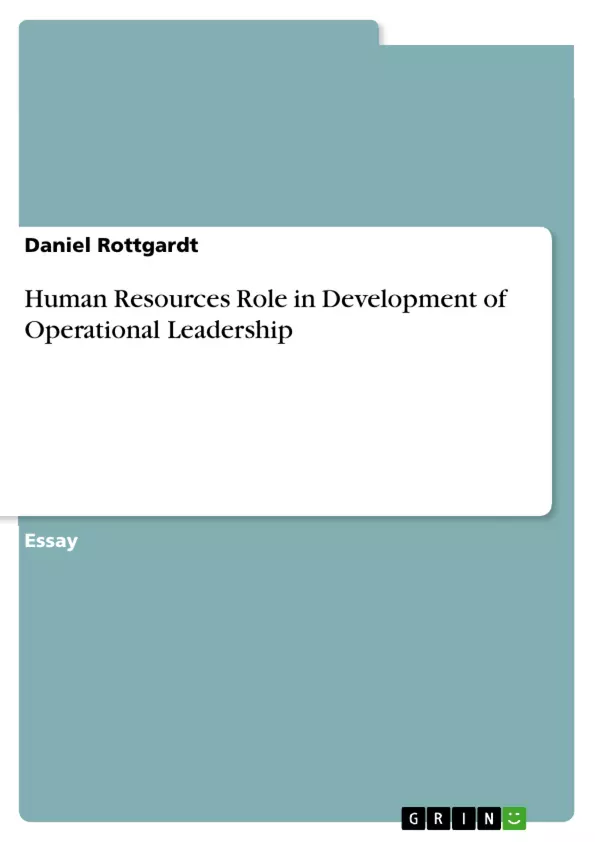A condensed introduction into the field of operational leadership well aligning with strategic people leader development topics.
My name is Daniel Rottgardt, and I am a Senior Global Human Resource Director working for many years in different multinational companies. My academic background is in Political Science, with a specific focus on international relations and political theory. I hold a Masters degree. With more than 20 years of experience in Human Resources I became particularly interested in leadership development and associated organizational development. Over the course of my professional career, I have seen how fundamentally important it is to equip leaders with more than just the nice and shiny theoretical underpinnings of mindset and behavior that are primarily aimed at a strategic leadership approach. It's crucial and equally important to ensure that a more tangible and pragmatic leadership skills approach which shapes the company culture is successfully implemented. As many of us likely know, “culture eats strategy for breakfast”. This led me to research the fundamentals of operational leadership development, which I will explore in short articles/essays. Looking ahead, I am excited to continue developing my work in operational leadership development. I am committed to contributing to the broader HR and people leaders community by openly sharing thoughts and hopefully help gaining insights.
Inhaltsverzeichnis (Table of Contents)
- Introduction
- The Role of Human Resources in Strategic Planning and Execution in Corporate Companies
- HR's Role in Strategic Planning
- Aligning Workforce with Corporate Strategy
- Workforce Planning and Talent Acquisition
- Organizational Culture and Change Management
- HR's Role in Strategy Execution
- Performance Management
- Employee Engagement and Retention
- Leadership Development
- Training and Development
- Succession Planning
- HR's Role in Strategic Planning
Zielsetzung und Themenschwerpunkte (Objectives and Key Themes)
This article aims to explore the vital role of Human Resources (HR) in the strategic planning and execution of corporate objectives. It examines how HR has evolved from a primarily administrative function to a strategic partner, essential for organizational success in today's dynamic business environment.
- The evolution of HR's role from administrative to strategic partner.
- HR's contribution to strategic planning, including workforce alignment and talent acquisition.
- The importance of HR in strategy execution through performance management and employee engagement.
- The role of HR in fostering a supportive organizational culture and managing change.
- HR's responsibility for leadership development and succession planning.
Zusammenfassung der Kapitel (Chapter Summaries)
Introduction: This introductory section introduces the author, Daniel Rottgardt, a Senior Global Human Resource Director with extensive experience in multinational companies. He highlights his interest in operational leadership development and the importance of a pragmatic approach to leadership skills, contrasting it with purely theoretical models. The author emphasizes the crucial role of company culture in achieving strategic goals, leading him to research and explore the fundamentals of operational leadership development.
The Role of Human Resources in Strategic Planning and Execution in Corporate Companies: This chapter delves into the multifaceted role of HR in achieving corporate success. It argues that HR is no longer just an administrative function but a strategic partner, crucial for both the development and execution of corporate strategies. The chapter is divided into two main sections: HR's role in strategic planning and HR's role in strategy execution. The first section emphasizes HR's involvement in aligning the workforce with corporate strategy, including workforce planning, talent acquisition, and fostering a supportive organizational culture. The second section focuses on HR's contributions to strategy execution through effective performance management, employee engagement and retention, leadership development, training and development, and succession planning. The overall argument presented is that a proactive and strategically aligned HR department is essential for a company's success in a constantly evolving market.
Frequently asked questions
What is the main topic of "The Role of Human Resources in Strategic Planning and Execution in Corporate Companies"?
The main topic explores the vital role of Human Resources (HR) in the strategic planning and execution of corporate objectives. It examines how HR has evolved from a primarily administrative function to a strategic partner, essential for organizational success in today's dynamic business environment.
What are the key themes discussed in the article?
The key themes are:
- The evolution of HR's role from administrative to strategic partner.
- HR's contribution to strategic planning, including workforce alignment and talent acquisition.
- The importance of HR in strategy execution through performance management and employee engagement.
- The role of HR in fostering a supportive organizational culture and managing change.
- HR's responsibility for leadership development and succession planning.
What is the author's background, as introduced in the introduction?
The author, Daniel Rottgardt, is a Senior Global Human Resource Director with extensive experience in multinational companies. He has an interest in operational leadership development and emphasizes a pragmatic approach to leadership skills.
What are the two main sections of the chapter titled "The Role of Human Resources in Strategic Planning and Execution in Corporate Companies"?
The two main sections are: HR's role in strategic planning and HR's role in strategy execution.
What does HR's role in strategic planning involve?
HR's role in strategic planning involves aligning the workforce with corporate strategy, including workforce planning, talent acquisition, and fostering a supportive organizational culture.
What does HR's role in strategy execution involve?
HR's role in strategy execution involves performance management, employee engagement and retention, leadership development, training and development, and succession planning.
What is the main argument presented in the chapter summary of "The Role of Human Resources in Strategic Planning and Execution in Corporate Companies"?
The main argument is that a proactive and strategically aligned HR department is essential for a company's success in a constantly evolving market.
- Citation du texte
- Daniel Rottgardt (Auteur), 2024, Human Resources Role in Development of Operational Leadership, Munich, GRIN Verlag, https://www.grin.com/document/1528660



